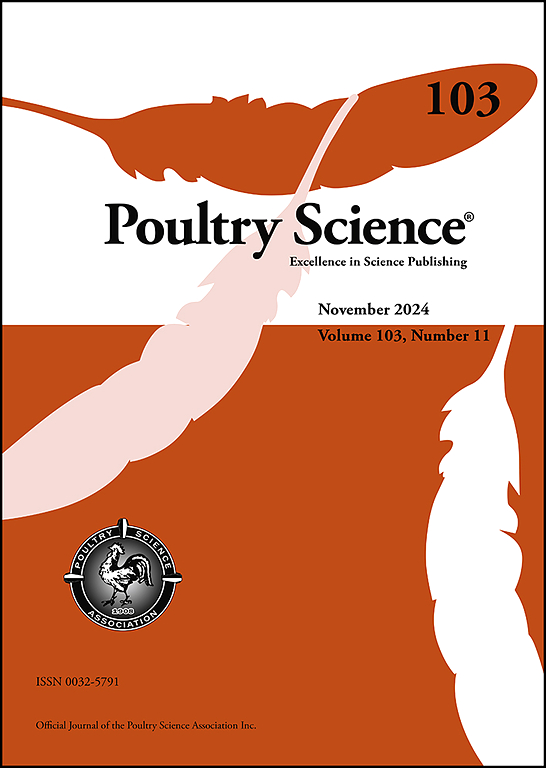Music intervention mitigates LPS-induced gut barrier disruption and immune stress in broilers via TLR4/NF-κB regulation
IF 3.8
1区 农林科学
Q1 AGRICULTURE, DAIRY & ANIMAL SCIENCE
引用次数: 0
Abstract
Immune stress induced by harsh environment in intensive farming can impair broiler intestinal health. Although music as an environmental intervention can alleviate short-term stress injury, its long-term regulatory mechanism on intestinal inflammation has not been clarified. In this study, we investigated the effects of a music-enriched environment on growth performance, intestinal barrier function, and inflammatory responses in lipopolysaccharide (LPS)-induced immunostressed broilers. AA broilers were randomly divided into four groups: control group (CON), music-enriched environment group (MUC), LPS-induced immune stress group (LPS) and music-enriched environment + LPS group (MUC+LPS). On the 14th, 16th and 18th days, the LPS and MUC+LPS groups were injected intraperitoneally with 500 μg of LPS to construct an immune stress model, and the CON and MUC groups were injected with an equal amount of saline. On day 28, the birds were sacrificed to detect the indicators associated with intestinal barrier and inflammation. The LPS group showed a significant decrease in performance from 14 to 28 days, with elevated serum levels of CORT, ACTH, DAO, and d-LA, and a decrease in the activity of intestinal mucosal SOD/GSH-Px, and impaired gut morphology. impaired; music remission significantly alleviated the decline in production performance, reduced the levels of stress hormones and markers of intestinal barrier damage, while elevating jejuno-ileal GSH-Px activity and improving intestinal morphology. Significant inflammatory gene expression characteristics were observed in jejunum and ileum tissues after LPS injection: upregulation of TLR4, NF-κB, TNF-α, IL-1β, and IL-6, and significant suppression of jejunal IL-10 expression. Notably, IL-10 and IFN-γ expression in the ileum did not show statistical differences. Inflammation-related gene expression showed an overall down-regulation trend after the music intervention, but was still significantly different from the control group. Music intervention on the regulation of jejunal MYD88 and ileal TNF-α - the LPS group did not show statistically significant differences in the expression of these two key inflammatory nodes with the LPS+MUS group. Mechanistic studies have shown that LPS triggers an oxidative stress cascade through activation of the TLR4/NF-κB signaling axis, leading to disruption of intestinal barrier integrity. In contrast, music exposure exerts a protective effect through a dual mechanism: on the one hand, it helps to enhance the expression of the tight junction protein ZO-1/Occludin to repair the physical barrier; on the other hand, it inhibits the activation of the TLR4/NF-κB pathway, which can effectively alleviate LPS-induced immunopathological damage.
音乐干预通过调节TLR4/NF-κB减轻lps诱导的肉鸡肠道屏障破坏和免疫应激
集约化养殖中恶劣环境引起的免疫应激会损害肉鸡肠道健康。虽然音乐作为一种环境干预手段可以缓解短期应激性损伤,但其对肠道炎症的长期调控机制尚不明确。本研究旨在研究音乐环境对脂多糖(LPS)免疫应激肉鸡生长性能、肠道屏障功能和炎症反应的影响。将AA肉鸡随机分为4组:对照组(CON)、富音乐环境组(MUC)、LPS诱导免疫应激组(LPS)和富音乐环境+LPS组(MUC+LPS)。第14、16、18天,LPS组和MUC+LPS组腹腔注射500 μg LPS建立免疫应激模型,CON组和MUC组腹腔注射等量生理盐水。第28天处死,检测肠道屏障和炎症相关指标。LPS组生产性能在14 ~ 28天显著下降,血清CORT、ACTH、DAO、d-LA水平升高,肠黏膜SOD/GSH-Px活性降低,肠道形态受损。受损;音乐缓解显著缓解了生产性能下降,降低了应激激素水平和肠道屏障损伤标志物水平,同时提高了空肠-回肠GSH-Px活性,改善了肠道形态。LPS注射后,在空肠和回肠组织中观察到明显的炎症基因表达特征:TLR4、NF-κB、TNF-α、IL-1β和IL-6表达上调,空肠IL-10表达明显抑制。值得注意的是,IL-10和IFN-γ在回肠中的表达无统计学差异。音乐干预后炎症相关基因表达总体呈下调趋势,但与对照组仍有显著差异。音乐干预对空肠MYD88和回肠TNF-α的调节作用——LPS组与LPS+MUS组在这两个关键炎症节点的表达上无统计学差异。机制研究表明,LPS通过激活TLR4/NF-κB信号轴触发氧化应激级联,导致肠屏障完整性破坏。相比之下,音乐暴露通过双重机制发挥保护作用:一方面,它有助于增强紧密连接蛋白ZO-1/Occludin的表达,修复物理屏障;另一方面抑制TLR4/NF-κB通路的激活,可有效减轻lps诱导的免疫病理损伤。
本文章由计算机程序翻译,如有差异,请以英文原文为准。
求助全文
约1分钟内获得全文
求助全文
来源期刊

Poultry Science
农林科学-奶制品与动物科学
CiteScore
7.60
自引率
15.90%
发文量
0
审稿时长
94 days
期刊介绍:
First self-published in 1921, Poultry Science is an internationally renowned monthly journal, known as the authoritative source for a broad range of poultry information and high-caliber research. The journal plays a pivotal role in the dissemination of preeminent poultry-related knowledge across all disciplines. As of January 2020, Poultry Science will become an Open Access journal with no subscription charges, meaning authors who publish here can make their research immediately, permanently, and freely accessible worldwide while retaining copyright to their work. Papers submitted for publication after October 1, 2019 will be published as Open Access papers.
An international journal, Poultry Science publishes original papers, research notes, symposium papers, and reviews of basic science as applied to poultry. This authoritative source of poultry information is consistently ranked by ISI Impact Factor as one of the top 10 agriculture, dairy and animal science journals to deliver high-caliber research. Currently it is the highest-ranked (by Impact Factor and Eigenfactor) journal dedicated to publishing poultry research. Subject areas include breeding, genetics, education, production, management, environment, health, behavior, welfare, immunology, molecular biology, metabolism, nutrition, physiology, reproduction, processing, and products.
 求助内容:
求助内容: 应助结果提醒方式:
应助结果提醒方式:


